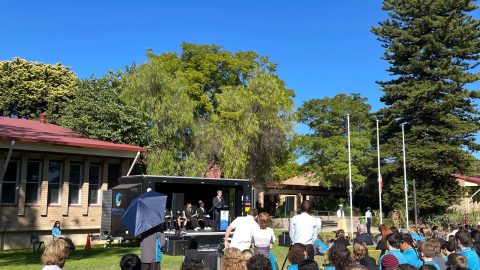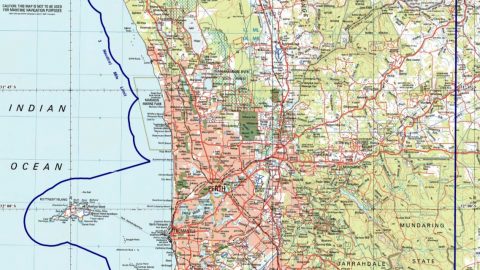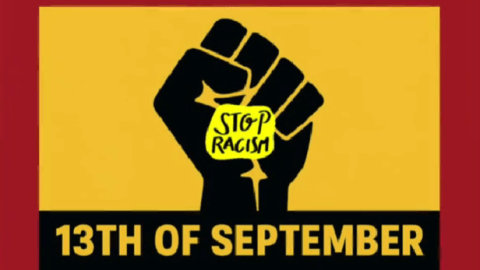When Fremantle became a nuclear-free zone in 1980, it was largely symbolic but symbols matter. In that era the policy supported protests against US ships with nuclear weapons entering Fremantle. With the probability of nuclear-powered submarines and visiting US and UK war ships arriving under AUKUS, Fremantle will again need to strongly uphold and defend its status as a nuclear-free port.
1977-1979
The Charles Court Liberal government is in power and is fighting with protestors — individuals and organisations, young and old, unions, churches, students and academics — on at least two fronts.

Credit Commons Library
In the far North, mining companies want to drill for oil on the traditional lands of the Yungngora people at Noonkanbah.
Closer to Perth, there is strong resistance to the Premier’s proposal to build a nuclear reactor near Perth and to increase uranium mining. Large protest rallies follow (before long 9,000 people builds to 20,000). Opposition by organisations such as PND (People for Nuclear Disarmament) and CANE (Campaign against Nuclear Energy) have the support of many unions.
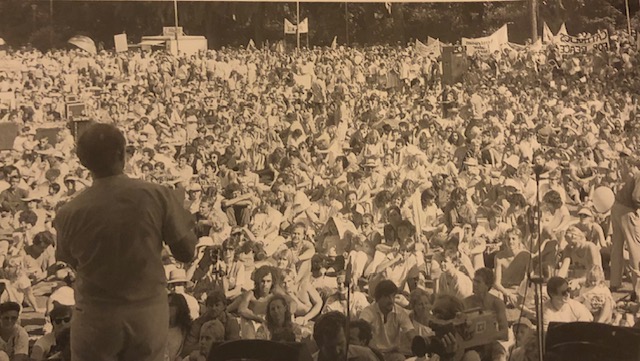
One of Premier Court’s responses is to pass a law (which became known simply as 54B) making it illegal for more than three people to meet on WA streets without a police permit. Nothing showed his unpopularity and relative powerlessness — at not being able to impose his government’s will — more than the passing of this law.
In protests against the law in 1979 and 1980, over 238 people are arrested, including Santa Claus, in Forrest Place.
1980
In the Council Chambers of the Fremantle City Council, Councillor Bill Latter proposes that Fremantle become a nuclear-free zone, the first in Australia. Over 1,700 signatures had been collected in support of the motion in the previous three weeks by the newly-organised Fremantle Anti-Nuclear Group (FANG).
The vote is passed 14-2 and Fremantle is soon followed by Kwinana and Cockburn Councils, as well as by local councils around Australia. Both Kwinana and Cockburn understand they are likely to be affected by any nuclear accidents in Cockburn Sound.
CANE coordinates the Australian nuclear-free zone campaign as a way of developing community debate around nuclear issues. In WA, nuclear-free zone signs now appeared in the three local government areas.
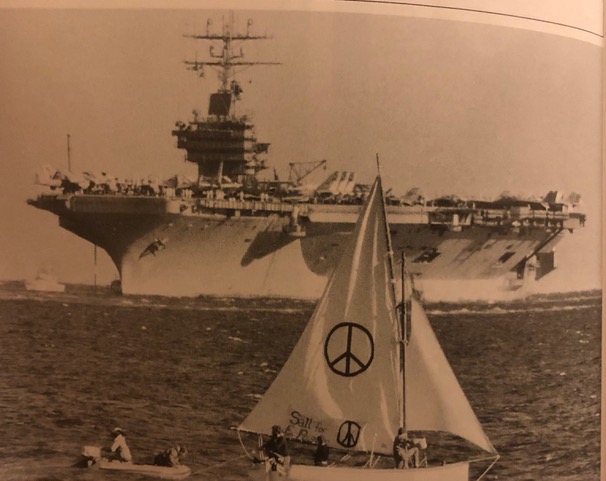
In the same year, the Fremantle City Council organises a conference on the Indian Ocean and a rally is held in favour of a regional Zone of Peace. Later in the year action is necessary to stop visits to Fremantle of US warships, some known to have nuclear weapons on board. A small strategic group, Project Iceberg, begins to organise actions to board ships and hang banners, protesting the US ships’ visits.
Four decades pass – 2021
Under a Federal Labor government, Australia enters into the AUKUS pact involving the building of nuclear-powered submarines, possibly in Fremantle.
The New Zealand government reaffirms its nuclear-free zone legislation and makes it clear that such vessels will not be allowed into their ports.
Nuclear-free zones now exist around the world and Fremantle City Council reviews its nuclear-free zone policy. The wording begins in an unequivocal fashion and ends on a submissive note.
On the issue of ships carrying nuclear weapons the Council states that neither it nor the Fremantle Port can ask for this information.
The entire Fremantle City Council policy first passed in 1980, then developed as policy in 2000 and amended in 2003 and 2021, reads as follows:
1. The whole municipality of Fremantle is a nuclear-free zone.
2. Council does not support the construction of nuclear power stations within the municipality.
3. Council would object to uranium, nuclear waste or other material connected with the nuclear power industry being stored or transported in or through the municipality.
4. Council is not opposed to the responsible use of radio-isotopes in hospitals within the municipality, as it believes the benefits to the users outweigh the risks to the community at large.
5. Council supports the attempts by the Shire of Chapman Valley to have its anti-nuclear policy incorporated into its town planning scheme.
6. Local Planning Scheme No. 4 includes provisions that preclude Council from approving ‘nuclear activity’ on zoned land within the municipality.
7. Council opposes the development of a nuclear waste facility in Western Australia, in particular it opposes any attempt to ship nuclear waste or products related to the construction of such a facility through Fremantle.
8. Visits by nuclear powered and/or armed ships. The conduct of visiting nuclear powered and/or armed ships is controlled through a commonwealth government document called ‘Visits by Nuclear Powered Warships to Australia Ports’. These guidelines stipulate that each visit is individually planned by a committee comprising various federal and state government agencies such as policy, health department, navy, defence, state emergency service and the Fremantle Port Authority and an emergency drill is practiced before each and every visit. Each vessel is given a specific location. In Fremantle none are allowed in the inner harbour. Four mooring points are allocated in Gage Roads. Two monitoring zones (600 metres and 2.2km) are recognised and there is continuous fixed and mobile radiation monitoring during a vessels stay. The presence of nuclear arms on a vessel may or may not be revealed. This is controlled by the Department of Defence in Canberra. Fremantle Port Authority advised they would not expect to be informed.
9. Transport of nuclear materials. The transportation of nuclear materials is controlled Australia wide via administered in WA through the Department of Health. The next amendment is expected to be 2025.
The Royal Australian Navy website currently states that, under AUKUS, Australia will become one of only seven nations to have nuclear submarines:
“Key features include: A range of opportunities for Australian personnel to work with and learn from UK and US Navies including increased visits to Australian ports by the UK Royal Navy and US Navy nuclear-powered submarines. Increased forward presence of Royal Navy and US Navy nuclear-powered submarines to Australia, to assist in developing knowledge and industrial capabilities. The delivery of three Virginia class nuclear-powered submarines for the Royal Australian Navy from as soon as the early 2030s, with the potential to acquire up to two more if needed. The development, construction and delivery for the Royal Australian Navy of an advanced, nuclear-powered submarine called ‘SSN-AUKUS’, incorporating Australian, UK and US technologies.”
2023
There is increased activity around AUKUS. The Perth South West Metropolitan Alliance (of six Local Governments, including Fremantle), endorses the 2023 Australian Naval Nuclear Power Safety Bill (AANNPS Bill) in December. In the Parliament of Australia Bills’ Digest for February 2024, the Bill is described as establishing a new regulator —the Australian Naval Nuclear Power Safety Regulator — which would have ” a range of compliance and enforcement powers.” And that “The Minister would be able to give the Regulator directions ‘if it is necessary … in the interests of national security and to deal with an emergency’. Further, the Bill Digest notes that the ANNPS Bill provides for a range of matters to be established in regulations and contains few transparency mechanisms.” The description ends with saying “The Senate Scrutiny of Bills Committee raised a number of concerns with the ANNPS Bill and has sought further information from the Minister.”
2024 with AUKUS looming
The Federal Labor government reaffirms that it will proceed with AUKUS and the AUKUS Taskforce website declares that Australia will soon acquire conventionally-armed, nuclear-powered submarines at the earliest possible date.
The Lowy Institute declares its concern that Australia’s decision will likely cause a proliferation of nuclear arms in our Indo-Pacific region. As is well-known, though best not dwelt on, the world already has enough nuclear weapons to wipe out the entire planet several times over.
City of Mayor Hannah Fitzhardinge says the Council will look at “any potential opportunities” and “particularly the technological capability elements” in the AUKUS nuclear submarine deal. While it is a statement which reaffirms the council’s commitment to encourage employment and training opportunities, it also substantially ignores Fremantle’s basic commitment to being nuclear-free, passed by an overwhelming majority in 1980 and revisited and spelt out as a policy in 2000, and amended in 2023.
As Sophie McNeill, who has nominated as a Greens Party candidate for the 2025 Legislative Council elections, points out, Fremantle as a nuclear-free zone is completely at odds with Defence Department plans for nuclear propulsion facilities to be built in Cockburn Sound including facilities to store and dispose of radioactive waste.
All nuclear energy-related activity can leak radiation, which can increase rates of cancer as well as increase nuclear accidents. There have been many, many accidents/incidents in nuclear-generating plants and in nuclear submarines since 1950, including the three largest incidents in Three Mile Island, USA (1997), Chernobyl, Ukraine (1986), and Fukushima, Japan (2011). Some of the most serious nuclear and radiation accidents (by death toll) in the world have involved core damage and release of radioactivity from nuclear-powered submarines, many of these were Russian, but not all. They include: loss of coolant incidents involving release of radioactivity (1960, 1961, 1970, 1989); the breakdown of reactor protection systems (1986); damage during refuelling (1965, 1985); reactor core damage during shipyard work (1968, 1980); failure of the first Alfa-class liquid-metal cooled reactor (1972, 1982); fire associated with hydraulics (1967). Nuclear submarine accidents also include: lost during a deep dive resulting in 129 crew deaths; implosion at sea (1968); sunk while pier side in shipyard due to improper ballasting (1969); fire and towing accident (1970); collision (1973); flooding due to shipyard errors (1983); fire onboard (1989)’;hydrogen peroxide leak causing deaths of all 118 crew and triggering firing of warheads (2000); incorrect surfacing under a Japanese training ship led to loss of lives (2001); sank while towing (2003); collided with seamount (2005).
Clearly, even with the best of training and the most sophisticated of technology, accidents are inevitable. As the Medical Association for the Prevention of War point out “In the UK, it was revealed in parliament in 2018 that there had been more than 500 submarine safety incidents in the previous 12 years, with the Ministry of Defence admitting to two events with ‘high potential for radioactive release to the environment’. In 2006, a submarine was within metres of disaster off the British coast and 2 crew members died, and in 2010 an HMS Astute submarine ran aground off the Isle of Skye.”
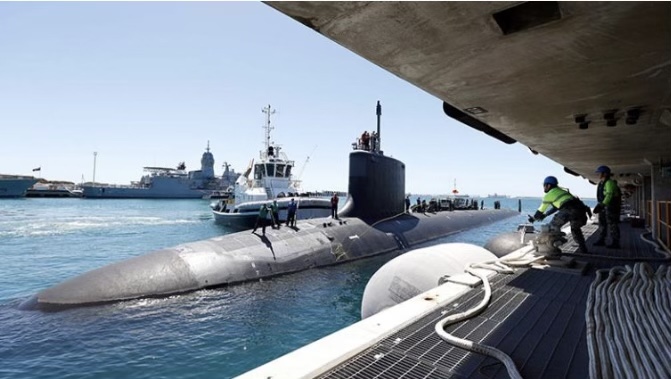
USS Mississippi at HMAS Stirling, December 2022. Credit Chief Petty Officer Yuri Ramsay
As the Lowy Institute points out, in Australia, the Labour government has not allowed “a full and proper public debate to air the costs and risks associated with nuclear submarines.” This, of course, also applies to Fremantle City Council and the need for a proper debate not as preparation for AUKUS but in relation to strengthening Fremantle’s nuclear-free commitment.
Declaring Fremantle as a nuclear-free zone in 1980 was not like introducing a ban on tigers where there are none, as the then Premier wanted to introduce a nuclear power plant with all its associated problems and nuclear waste and, around that time, US ships began entering Fremantle carrying nuclear weapons. Resistance to these visits continued through the 80s.
We are now entering another phase where we all need to be reacquainted with the risks of nuclear power whether in shipping or in nuclear power plants. The Liberal opposition have declared their attention to build nuclear power plants should they win the 2025 election. Nuclear energy and the building of nuclear power plants is not the new ecological solution to climate change problems, as some would like to believe. Nuclear power plants are expensive to produce and take a very long time to build. They are not accident proof and the waste they produce has an extensive half-life. Under AUKUS, Australia will be responsible for all its nuclear waste, a problem which will be a substantial problem as it already is in other countries.

File photo of APL Mexico City in Fremantle. Credit Jean Hudson
Very recently, in January 2024, a ship – Mexico City – carrying uranium ore arrived in Fremantle port and the Maritime union refused its handling. The West Australian newspaper reported that the uranium was in eighteen containers on the ship and it left Adelaide on 30 December following a route approved by the Australian Safeguards and Non-Proliferation Office (ASNO). The cargo was classed as DG Class 7 — Radioactive Material. “Radioactive cargoes are rare”, the Port Authority spokesperson said. “Last year we had two and in the previous year five.” The cargo remained in its containers and the wharfies themselves said they were not familiar with such radioactive cargo.
A long-time friend, retired academic and fellow activist in the fight against visits by US ships with nuclear weapons attended the recent AUKUS meeting held in the Fremantle Civic Centre, organised by doctors and teachers against AUKUS. She said she looked around the hall and saw that the meeting was mainly attended by older people. Where are all the young people? she asked.
Political will is strong and powerful. If the government wants something to happen, it will happen if there is little opposition. Only great numbers of people, both young and old, individual and organisations showing strong and strategic opposition, and insisting on transparency, will change the otherwise inevitable. Vigilance and knowledge is all in these difficult times.
By Christine Owen with thanks to Dave Worth for permission to use his extensive writings on the 1980s anti-nuclear and other protest movements in Western Australia. For more information visit theCommons Social Change Library.
~~~~~~~~~~~~~~~~~~~~~~~~~~~~~~~~~~~~~~~~
* If you’d like to COMMENT on this or any of our stories, don’t hesitate to email our Editor.
** WHILE YOU’RE HERE –
PLEASE HELP US TO GROW FREMANTLE SHIPPING NEWS
FSN is a reader-supported, volunteer-assisted online magazine all about Fremantle. Thanks for helping to keep FSN keeping on!
*** Don’t forget to SUBSCRIBE to receive your free copy of The Weekly Edition of the Shipping News each Friday!
